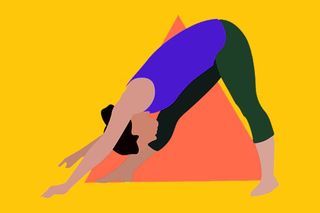
Science Finally Validates Meditation, Yoga’s Effect on Focus
Mindful breathing directly affects the brain.

Well, Baba Ramdev was right about at least one thing (besides the monetary potential of the Indian wellness market): Breath-focused practices like pranayama really do sharpen your mind.
A new study from Trinity College Dublin has found that meditation, pranayama, and other breath-centered practices are able to increase your attention span and even stimulate brain growth.
The research finally explains the reason behind the known cognitive benefits of breathing practices, such as increased ability to focus, more positive emotions, less emotional reactivity, and improved arousal levels. According to researchers, breathing directly affects the production of a chemical messenger in our brains called noradrenaline, which, when present in the right levels, stimulates brain growth by encouraging new neural connections. Noradrenaline functions as a sort of ‘all-purpose’ action system in the brain, and is also released when we are challenged, curious, focused, or energized.
“When we are stressed we produce too much noradrenaline and we can’t focus. When we feel sluggish, we produce too little and again, we can’t focus,” said the study’s lead author, Michael Melnychuk. “There is a sweet spot of noradrenaline in which our emotions, thinking and memory are much clearer.”
The study looked at participants’ ability to focus while performing a task that required a large amount of attention. Participants who were able to focus better had more synchronisation between their breathing patterns and their attention, while participants with poor focus had the reverse. Researchers believe it’s possible to use breathing practices like meditation and pranayama to help boost your concentration and brain health. Aerobic exercise may also be similarly beneficial.
Of course, Indian yoga practitioners have been saying the same thing for several thousand years, a fact which the researchers acknowledge. “Yogis and Buddhist practitioners have long considered the breath an especially suitable object for meditation,” says Ian Robertson, co-director of the study. “Our research finds that there is evidence to support the view that there is a strong connection between breath-centred practices and a steadiness of mind.”
There are two broader types of breath-centered practices: mindfulness and pranayama. The former emphasizes a focus on feeling the sensations of respiration, and may be most beneficial in improving focus and concentration. Pranayama places more emphasis on controlling the breath and could be most helpful for people whose attention span is affected by other sensations, such as a pounding heart during an exam or drowsiness while driving. Both pranayama and mindfulness have been found to have positive repercussions in both the long and short term.
The findings suggest that there may be ways to slow down brain ageing. Brains usually lose mass as they age, but this happens to a lesser degree for long-time meditators. “More ‘youthful’ brains have a reduced risk of dementia and mindfulness meditation techniques actually strengthen brain networks,” says Robertson.
Future research along these lines could support cognition in the elderly, and even help develop therapies and treatments for those with attention compromised conditions like ADHD and traumatic brain injury.
As for now, people may look at you like you’re an idiot when you practice your anulom vilom or simhasana in public, but the joke’s on them, because you’ll probably be as sharp as a tack in your old age. You could even use all those extra neural connections in your brain to grow your own Baba Ramdev-style wellness empire one day.
Related


Research Probes Effect of Men’s, Women’s Mental Health on Fertility
